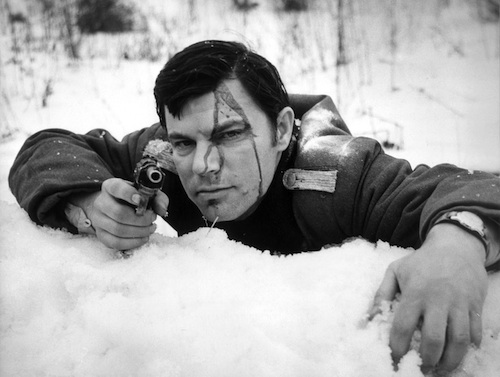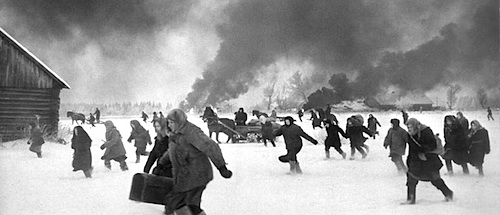
By Joe Bendel. It suggests the Red Army was often less than heroic during the Second World War, and implies treason is sometimes an understandable option during unreasonable times. You had better believe it was banned by the Soviet government. Frankly, it is hard to imagine how it was ever greenlit in the first place. Of course, by western standards, it is a relatively restrained portrayal of the absurdity and petty cruelty of war, but it was far too potent for the state authorities. There will be little glory and absolutely no fun whatsoever to be found in war throughout Aleksei Guerman’s Trial on the Road, which screens during Anthology Film Archive’s mini Guerman film series.
Red Army Sergeant Alexander Lazarev defected to the Germans, lured by the promise of an easier life. In the short term, he would have been considerably more comfortable if he had stayed with the Germans. However, he allows himself to be captured out of a rekindled sense of patriotism. Naturally, he meets with a decidedly mixed receptive. Many new comrades, including the unit’s political officer, are in favor of summary execution.
Fortunately, the nominal commanding officer has other ideas. He would much prefer to see Lazarev die a redemptive death during a recklessly dangerous assignment. While there is no shortage of peril during Lazarev’s missions, it just seems like everyone else does all the dying.
From a Communist censor’s perspective, that kneejerk political officer has to be especially problematic, but Trial is veritable minefield of objectionable material. Its entire interpretation of reality contradicts the old Soviet mother-myth of the “Great Patriotic War.” People are cheap and the Communist war machine will dispose of them as it pleases.

Vladimir Zamansky is absolutely riveting as Lazarev. He is a completely convincing battle-hardened and world-weary hardnose, but when he periodically breaks down, overwhelmed by pointless barbarity of the war, it is heavy stuff. Likewise, Oleg Borisov supplies a powerful counterpunch as Solomin, one of Lazarev’s bitterest detractors, who pays dearly for a lesson in forgiveness.
Trial is an incredible film that combines tragedy and absurdity in a manner that feels so quintessentially Russian. The striking black-and-white cinematography and slightly surreal backdrops also show the early, subtle hallmarks of Guerman’s mature style. It is a shame Trial (his first sole directorial credit) and My Friend Ivan Lapshin (his third film, not released fourteen years later), were censored for so long. He was an extraordinary cinematic storyteller and stylist, but he was on the outs with the Soviet power structure during most of what should have been his peak creative years. Once again, the entire world has been impoverished by Communism. One of the best war films you will see on a New York screen this year, Trial on the Road screens again this Tuesday (2/10) as part of Anthology Film Archives’ Guerman mini-retrospective.
LFM GRADE: A+
Posted on February 6th, 2015 at 12:33pm.